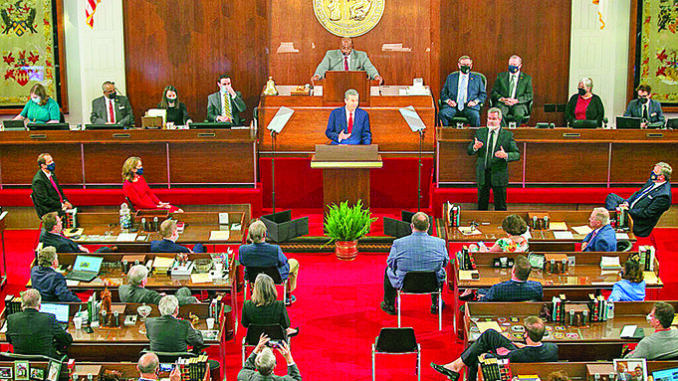
RALEIGH — Gov. Roy Cooper and the leaders of both majority and minority parties at the N.C. House and Senate released identical press statements on Friday, Oct. 3 announcing a bipartisan agreement on the direction of the state’s energy future. The release said this legislation is expected to be passed through the General Assembly this week and was heard in the Senate Agriculture, Energy and Environment Committee at noon on Tuesday.
In the previous 49-page version, passed in July, the precise path to a slightly lower reduction of “at least 61%” was laid out with more detail — including which coal-fired plants would need to be shuttered. This new 10-page agreement allows the details of how to reach these dramatic cuts in CO2 to be worked out later, requiring the state’s Utilities Commission “to follow the least cost pathway in reducing carbon emissions by 70% by the year 2030 and achieving carbon neutrality by 2050 without sacrificing reliability.”
“This bipartisan agreement sets a clean energy course for North Carolina’s future that is better for the economy, better for the environment, and better for the pocketbooks of everyday North Carolinians,” Cooper said on the plan. “I am encouraged that we have been able to reach across the aisle to find a way forward that will update our energy systems while saving people money and doing our part to slow climate change.”
There had been months of negotiations after the previous version of H.B. 951 stalled. The bill passed the House 57-49 largely along partisan lines on July 15. Cooper, who is not shy about vetoing legislation, made clear he would not allow the current version to become law.
Major sticking points for Democrats had included the bill’s relaxing of rules around rate increases for utility companies and that they felt the bill did not go far enough to reduce carbon emissions.
The version passed in July would have retired coal-fired plants, but environmentalist groups said the inclusion of natural-gas plants in the plan did not take the problem of climate change seriously enough. The new version, while vaguer on the details, does increase the goals for cutting CO2.
“This legislation will put our clean energy aspirations into action,” said Senate Minority Leader Dan Blue (D-Wake). “We need to continue working to protect our environment, and all rate payers, as we move North Carolina to a clean energy future.”
Republicans’ priorities, as seen in their statements, focused more on maintaining reliability and lower-cost energy.
“North Carolina is a growing state, attracting businesses and families from all over,” Senate Leader Phil Berger (R-Eden) said in the joint statement. “That growth depends on a stable supply of reliable and affordable energy. After months of policy negotiations, we reached an agreement that will signal to businesses and families here now or considering a move here that North Carolina’s leaders are committed to pro-growth energy policies.”
Writing for WRAL’s opinion section on Sept. 28, former Virginia attorney general, and recent Trump administration official, Ken Cuccinelli wrote that the July version of the bill looked like it was going to repeat a number of mistakes that he believed Virginia had made. His main points centered around how Virginia’s Dominion Energy was a similar state monopoly as Duke Energy is in North Carolina, and making energy policy around these giants is not to the benefit of consumers or the state.
“Duke Energy clearly benefits from every major provision at the expense of everyone else,” Cuccinelli wrote. “Key provisions to extend the period of time between utility company’s rate hike cases — known as multi-year rate plans — are also embedded within HB 951. A similar structure approved in Virginia several years ago has been disastrous for customers. Virginia regulators just announced that Dominion Energy earned a profit of 13.61% from 2017 to 2020, resulting in $1.143 BILLION in over-collections from customers (i.e., over-earning).”
Duke Energy previously had to get rate increases approved on a yearly basis, but the bill would allow the utilities commission to approve three-year blocks. The new version maintains this change, with the joint press release stating that the bill “Provides for the Utilities Commission to develop multi-year rate plans and performance-based incentives on ratemaking,” but still “includes strong protections that limit the utility’s ability to over earn.”
In addition, the deal assures Duke Energy and other utilities a majority of solar-energy generation, with another 45% “to come from a competitive bidding process among Independent Power Producers.”
The new draft of the bill also saw pushback from the left, with the N.C. Justice Center saying it “opposes this legislation due to the harmful anticipated cost impacts it will have on people with low incomes,” saying they believe that “Households spending $2,400 a year on electricity, for example, would see the cost jump to $3,600 annually.”
The specific “subcritical coal-fired generating facilities” marked for shuttering in the July version were the Allen Plant in Gaston County, Marshall Units 1 and 2 in Catawba County, the Roxboro Plant and the Mayor Plant in Person County, and Cliffside Unit 5 in Cleveland County. To reach its goal of 70% reduction in greenhouse gasses by 2030, these same plants are likely still being considered for retirement.


